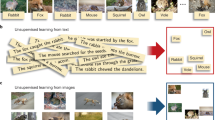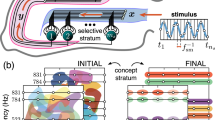Abstract
One of the unsolved problems in the field of human concept learning concerns the factors that determine the subjective difficulty of concepts: why are some concepts psychologically simple and easy to learn, while others seem difficult, complex or incoherent? This question was much studied in the 1960s1 but was never answered, and more recent characterizations of concepts as prototypes rather than logical rules2,3 leave it unsolved4,5,6. Here I investigate this question in the domain of Boolean concepts (categories defined by logical rules). A series of experiments measured the subjective difficulty of a wide range of logical varieties of concepts (41 mathematically distinct types in six families—a far wider range than has been tested previously). The data reveal a surprisingly simple empirical ‘law’: the subjective difficulty of a concept is directly proportional to its Boolean complexity (the length of the shortest logically equivalent propositional formula)—that is, to its logical incompressibility.
This is a preview of subscription content, access via your institution
Access options
Subscribe to this journal
Receive 51 print issues and online access
$199.00 per year
only $3.90 per issue
Buy this article
- Purchase on Springer Link
- Instant access to full article PDF
Prices may be subject to local taxes which are calculated during checkout



Similar content being viewed by others
References
Bourne, L. E. Knowing and using concepts. Psychol. Rev. 77, 546–556 (1970).
Posner, M. I. & Keele, S. W. On the genesis of abstract ideas. J. Exp. Psychol. 77, 353– 363 (1968).
Rosch, E. H. Natural categories. Cogn. Psychol. 4, 328 –350 (1973).
Osherson, D. N. & Smith, E. E. On the adequacy of prototype theory as a theory of concepts. Cognition 9, 35–58 (1981).
Medin, D. L. & Smith, E. E. Concepts and concept formation. Annu. Rev. Psychol. 35, 113– 138 (1984).
Komatsu, L. K. Recent views of conceptual structure. Psychol. Bull. 112, 500–526 (1992).
Medin, D. L., Wattenmaker, W. D. & Hampson, S. E. Family resemblance, conceptual cohesiveness, and category construction. Cogn. Psychol. 19, 242–279 (1987).
Nosofsky, R. M., Palmeri, T. J. & McKinley, S. C. Rule-plus-exception model of classification learning. Psychol. Rev. 101, 53– 79 (1994).
Pinker, S. Rules of language. Science 253, 530– 535 (1991).
Smith, E. E., Patalano, A. L. & Jonides, J. Alternative strategies of categorization. Cognition 65, 167–196 ( 1998).
Neisser, U. & Weene, P. Hierarchies in concept attainment. J. Exp. Psychol. 64, 640– 645 (1962).
Bourne, L. E., Ekstrand, B. R. & Montgomery, B. Concept learning as a function of the conceptual rule and the availability of positive and negative instances. J. Exp. Psychol. 82, 538–544 ( 1969).
Medin, D. L., Wattenmaker, W. D. & Michalski, R. S. Constraints and preferences in inductive learning: an experimental study of human and machine performance. Cogn. Sci. 11, 299–339 ( 1987).
Shepard, R., Hovland, C. L. & Jenkins, H. M. Learning and memorization of classifications. Psychol. Monogr. Gen. Appl. 75, 1– 42 (1961).
Nosofsky, R. M., Gluck, M. A., Palmeri, T. J., McKinley, S. C. & Glauthier, P. Comparing models of rule-based classification learning: a replication and extension of Shepard, Hovland and Jenkins (1961). Mem. Cogn. 22, 352– 369 (1994).
Wegener, I. The Complexity of Boolean Functions (Wiley, Chichester, 1987).
Givone, D. D. Introduction to Switching Circuit Theory (McGraw Hill, New York, 1970).
Chaitin, G. J. On the length of programs for computing finite binary sequences. J. Assoc. Comput. Machin. 13, 547– 569 (1966).
Kolmogorov, A. N. Three approaches to the quantitative definition of information. Problems Inf. Transm. 1, 1–7 (1965).
Solomonoff, R. J. A formal theory of inductive inference. Part I. Inf. Control. 7, 1–22 (1964).
Li, M. & Vitányi, P. An Introduction to Kolmogorov Complexity and its Applications (Springer, New York, 1997).
Garey, M. R. & Johnson, D. S. Computers and Intractability: A Guide to the Theory of NP-completeness (Freeman, New York, 1979).
Hovland, C. I. & Weiss, W. Transmission of information concerning concepts through positive and negative instances. J. Exp. Psychol. 45, 175–182 (1953).
Haygood, R. C. & Devine, J. V. Effects of composition of the positive category on concept learning. J. Exp. Psychol. 74, 230–235 ( 1967).
Nahinsky, I. D. & Slaymaker, F. L. Use of negative instances in conjunctive concept identification. J. Exp. Psychol. 84, 64–68 ( 1970).
Rissanen, J. Modeling by shortest data description. Automatica 14 , 465–471 (1978).
Chater, N. Reconciling simplicity and likelihood principles in perceptual organization. Psychol. Rev. 103, 566– 581 (1996).
Acknowledgements
Supported in part by a grant from the National Science Foundation. I thank S. J. Hanson, W. A. Richards, J. Tenenbaum and P. Tremoulet for helpful comments, and M. Balaban, E. Barenholtz, D. Berse, N. Folsom-Kovarik, J. Sutton and P. Tremoulet for assistance in data collection.
Author information
Authors and Affiliations
Corresponding author
Rights and permissions
About this article
Cite this article
Feldman, J. Minimization of Boolean complexity in human concept learning. Nature 407, 630–633 (2000). https://doi.org/10.1038/35036586
Received:
Accepted:
Issue Date:
DOI: https://doi.org/10.1038/35036586
This article is cited by
-
A comparative investigation of integral- and separable-dimension stimulus-sorting behavior
Psychological Research (2023)
-
Strategic complexity and cognitive skills affect brain response in interactive decision-making
Scientific Reports (2022)
-
Rational arbitration between statistics and rules in human sequence processing
Nature Human Behaviour (2022)
-
The Effort of Reasoning: Modelling the Inference Steps of Boundedly Rational Agents
Journal of Logic, Language and Information (2022)
-
How Do People Generalize Causal Relations over Objects? A Non-parametric Bayesian Account
Computational Brain & Behavior (2022)
Comments
By submitting a comment you agree to abide by our Terms and Community Guidelines. If you find something abusive or that does not comply with our terms or guidelines please flag it as inappropriate.



